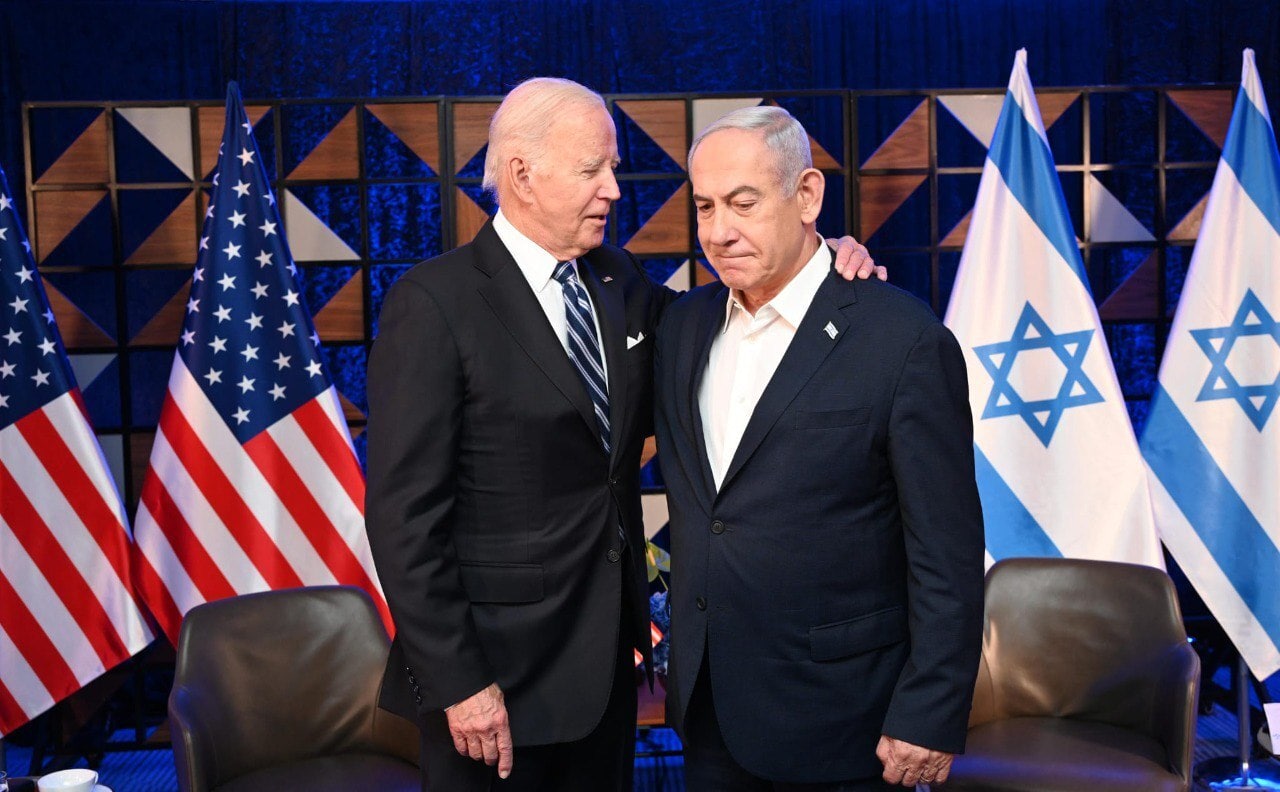There has never been a golden age of Israeli/Palestinian policy. For the parties involved, and others with a stake in facilitating a peaceful resolution between them, every phase of their conflict has felt like an impossible challenge. Even the heady days of the 1990s Oslo process were overhung by doubts about Palestinian leader Yasser Arafat’s sincerity and the plausibility of Israel’s actual withdrawal from occupied territories that it was actively settling. But not during the past 75 years has there been a time when pessimism was more warranted: Large segments of both communities now reject the very notion of coexistence. Hamas’ terrorist attack on Oct. 7, 2023, and Israel’s brutal retaliatory invasion of Gaza have all but obliterated any trust and goodwill that might have existed on either side. The only external actor with any real capability to reshape this conflict is the United States: For good or for ill, any hope of resolution flows through America. So, in the face of a seemingly insoluble dilemma, what should the U.S. do?
President Joe Biden has pursued a “bear hug” strategy toward Israel: Despite occasional statements of displeasure, he has presented a close alignment with Israeli Prime Minister Benjamin Netanyahu. The Republican candidate for president, Donald Trump, promises to hug Netanyahu even closer. This strategy has produced nothing over the time Biden has embraced it, and it produced nothing during the four years Trump employed it during his own presidency. This same basic strategy – rhetorical support for Palestinian aspirations, paired with unchanging patronage of Israel economically, diplomatically, and militarily – has been carried through from administration to administration for decades. Perhaps it is time for a change.
Any reformulated U.S. policy that continues to provide unstinting support to Israel, regardless of Israeli actions, is not a reformulated policy. Absent any conditionality to U.S. support, it is just the same policy that has continually failed. There are abundant spoilers on the Palestinian side of the equation, from the open terrorism of Hamas and Islamic Jihad in Gaza to the corrupt ineffectiveness of the Palestinian Authority in the West Bank. But Israel, as the holder of de facto control over all Palestinian territories, has the ultimate power to make or break any two-state solution. The U.S. has limited influence on Palestinian actors but considerable influence on their Israeli counterparts. With a handful of limited exceptions, Washington has historically been unwilling to use this leverage. It should. This leverage could be applied across all three spheres in which the U.S. provides support for Israel: Economic, diplomatic, and military.
Potential for Economic Leverage
For nearly two decades, almost all U.S. economic aid to Israel has been provided in the form of military assistance. Since its founding, Israel has cumulatively received more U.S. assistance than any other nation. But military aid is not charity; it is a tool of statecraft, meant to advance the donor nation’s security interests. Customarily, if a recipient of American military aid adopts policies counter to U.S. goals, that aid is reexamined. This is normal and proper. Pakistan (for example) is a designated major non-NATO ally, but after years of acting against U.S. interests by supporting the Taliban and providing refuge for Osama bin Laden, its security aid was slashed from more than $1.2 billion in 2011 (the year of the raid on Bin Laden’s hideout) to about 3% of this amount every year since 2018. Israel is not sheltering America’s most-wanted terrorist, but few unbiased observers would claim that its current Gaza campaign is in line with U.S. security interests.
Under a memorandum of understanding between Netanyahu and then-President Barack Obama, Israel is scheduled to receive $3.8 billion annually in military aid through 2028. Over and above this yearly allocation is a massive surge of $14 billion approved in April. These amounts are unlikely to be altered, but future aid levels should be open to reexamination—and if Israel continues to act in ways directly contrary to explicit U.S. policy (for example, by maintaining an occupation of Palestinian territories that the United States, along with virtually all other nations, considers illegal) should be reduced. Would a reduction of U.S. military aid leave Israel at the mercy of adversaries like Iran? Hardly. Israel is militarily superior to any of its potential enemies – indeed (as it has demonstrated in every war it has ever fought) to all of them combined. It could defend itself without any American assistance. One person who says so is Netanyahu.
Potential for Diplomatic Leverage
The U.S. protects Israel at the United Nations and other international fora – quite often at the expense of its standing with other allies and partners. The U.S. is frequently the only major power supporting Israel, and it often expends its diplomatic capital to strong-arm other nations into adopting pro-Israel positions. The costs of such support are significant: America cannot credibly serve as a global champion for the rule of law and human rights while simultaneously wielding a veto against exactly these same ideals whenever they are applied to Israel. If Russia had invaded Ukraine in 2024 instead of 2022, would the U.S. have been able to assemble a coalition of 141 nations to condemn it?

Over the past four years, under policies forged by Trump but kept in place by Biden, the U.S. has also applied its diplomatic tools on Israel’s behalf outside the realm of international organizations. Trump unilaterally granted the most significant diplomatic prizes offered to Israel by any U.S. president in decades. He moved the U.S. Embassy from Tel Aviv to Jerusalem and recognized Israeli annexation of the Golan Heights. He expended U.S. diplomatic capital to induce four Arab nations to recognize Israel: A free trade agreement for Bahrain; recognition of a massive territorial claim for Morocco; a deal for state-of-the-art F-35 fighter jets for the United Arab Emirates; and the removal from the U.S. state terrorism list and a soft loan of $1.2 billion for Sudan. Prior administrations had reserved many of these concessions for use as potential deal-sealers for a Palestinian settlement.
What Can the U.S. Do Going Forward?
First, stop reflexively serving as Israel’s automatic veto. Is all international criticism of Israel invalid? Has Israel never done anything meriting international rebuke? When the International Criminal Court (ICC) issued an arrest warrant for Russian President Vladimir Putin on war crimes charges in 2023, Biden applauded the decision. However, when the ICC prosecutor sought an arrest warrant for Netanyahu for war crimes, Biden termed the move “outrageous.” The U.S. was under no obligation to offer an opinion, let alone needlessly discredit one of the pillars of the international rule of law.
Second, stop trying to extend the Trump administration’s Abraham Accords framework – that is, U.S. inducements to Arab nations for recognition of Israel – in the absence of any Israeli concession to Palestinian aspirations. The nation closest to receiving such treatment next is Saudi Arabia, and the enticements are immense: the supply of U.S. nuclear technology and a defense pact that would obligate American troops to defend the Saudi monarchy. Even Biden’s deputy national security advisor has said that, in order to gain this diplomatic reward for Israel, “We will have to do things for Saudi Arabia that will be very unpopular in this country and in our Congress.”
Third, recognize Palestinian statehood. This is not nearly as radical a step as it might sound: 146 of the United Nations’ 193 members recognize Palestine as a sovereign nation. This group includes such sober American partners and allies as Spain, Norway, Sweden, Ireland, South Africa, the Philippines, and Ukraine. The United Kingdom and France have openly suggested the possibility of joining them, and the leading party in the newly elected French parliament, the New Popular Front, has pledged to recognize Palestine statehood at the earliest possible moment. Biden could do so without even asking congressional approval – exactly as President Harry Truman recognized the state of Israel in 1948.
Potential for Military Leverage
The U.S. is a security ally of Israel, and no mainstream political voices are arguing for any change in that status. When Iran launched a ballistic missile and drone attack against Israel in April (albeit in retaliation for an Israel assassination of Iranian military officers at a diplomatic facility in Syria), the U.S. spearheaded a multinational effort that destroyed 99% of the incoming weapons. The U.S. supplies $500 million per year for Israel’s multilayered missile defense system that includes the well-known Iron Dome, an allocation that even the harshest American critics of Netanyahu’s Gaza policy do not generally question. But transfers of offensive or dual-use military hardware – whether supplied with U.S. funds via assistance programs or purchased by Israel with its own money – are a very different matter. For these, the U.S. could have a real impact on Israeli policy without any breach in the treaty relationship and without in any way endangering Israel’s legitimate security. All the administration would have to do would be abide by existing U.S. law.
At least three provisions of U.S. law appear to forbid many (perhaps most) arms transfers to Israel under current conditions:
- The Leahy Amendment to the Foreign Assistance Act (Section 620M of the Foreign Assistance Act of 1961, 22 U.S.C 2378d) bars assistance “to any unit of the security forces of a foreign country if the Secretary of State has credible information that such unit has committed a gross violation of human rights.” One of the worst-kept secrets in Washington is that the Leahy Amendment has never, in practice, been applied to Israel. The director of the State Department’s office responsible for Leahy vetting for seven years, shortly after his retirement last year, spelled out this noncompliance. In May, a powerful voice advocated (finally) for subjecting Israel to Leahy vetting: former Sen
ator. Patrick Leahy himself.
- The Humanitarian Aid Corridor Act (Section 620I of the Foreign Assistance Act of 1961, 22 U.S.C 2378-1) forbids all arms transfers to any nation that “prohibits or otherwise restricts, directly or indirectly, the transport or delivery of United States humanitarian assistance.” According to the Biden administration itself, Netanyahu’s government clearly falls into this category – as eight senators reminded the White House in a letter sent in March 2024.
- The White House’s own Conventional Arms Transfer Policy (National Security Memorandum 18), which lays out the administration’s understanding of how arms may be transferred in compliance with existing U.S. law, would seem to mandate an across-the-board halt in transfers. This document (Sec. 4) bars all transfers of military hardware when “it is more likely than not that the arms” will be used to commit “serious violations of international humanitarian or human right law.”
Future arms sales – that is, those not currently in the approved pipeline – are another part of military support to Israel that the U.S. should reexamine. In March, Biden approved the sale of 50 F-15 fighter jets worth $18 billion to Israel. The two top Democrats on the House and Senate Foreign Affairs committees put a hold on the sale – and the administration spent two months strong-arming them (ultimately, successfully) on Israel’s behalf. The only pause in transfers to date was a single shipment of munitions too large to serve a militarily proportionate purpose in urban warfare; one week later, the White House notified Congress of plans to approve arms transfers worth $1 billion, including $700 million for tank ammunition. This left even the president’s closest allies mystified: Senate Foreign Relations Committee Chairman Ben Cardin said the administration’s policy was not understood, “certainly not by Israel, certainly not by the public and certainly not here [in Congress].”

Conclusion
The application of U.S. economic, diplomatic, and military leverage could persuade Netanyahu (or his successor) that the cost of rejecting a two-state solution is just too high. After all, Israel’s own military leadership is nearly in mutiny over its demand for a plan to transfer Gaza to Palestinian control, and the same rationale applies to the West Bank. As the U.S. itself learned in Afghanistan and Iraq (relearning the lessons of Vietnam), military might is seldom sufficient to administer an alienated populace indefinitely.
Israel’s return to the negotiating table wouldn’t guarantee a happy ending: Any offer Israel might plausibly bring today would likely be rather less generous than the one Arafat rejected at Camp David in 2000; Arafat himself, for all his (many) faults, recognized that he had failed to lay the groundwork with his own people for the painful compromises inherent in a deal that was still far better than any the Palestinians would likely ever to be offered. And there is no Palestinian leader today with anything like Arafat’s stature to sell half a loaf to a community that is literally starving.
Moreover, it is possible that no amount of U.S. leverage would result in a change in Israeli policy: Netanyahu’s primary motivation may well be staying out of prison, and if he holds on to his far-right coalition (which adamantly opposes even the slightest movement toward Palestinian statehood), he can do that until 2026. Moreover, Israeli public opinion has moved away from support for a two-state solution in the time since the Palestinians’ second intifada, and any likely successor to Netanyahu would be hard-pressed to take the bold steps that Yitzhak Rabin, Shimon Peres, and Ehud Barak took to bring a two-state solution tantalizingly close in the 1990s.
But even if the application of U.S. leverage failed to reverse Israel’s rejection of Palestinian aspirations, it would serve an important purpose: It would align U.S. policy with its stated values. There simply is no way that the U.S. can support Israel’s open-ended occupation of all Palestinian territories, and the inevitable brutality inherent in such a military occupation, without sacrificing its claims to champion international order, human rights, and rule of law. The current policy has achieved virtually nothing, greatly weakened American credibility, and shows no sign of producing any better outcome in the future than it has in the past.
Vice President Kamala Harris has been somewhat more supportive of Palestinian aspirations over the past half-year than has Biden, and if she replaces him at the top of the Democrats’ presidential ticket, as appears likely, it opens the possibility of a more muscular U.S. policy in the future. Any drastic shift, however, must still be considered a longshot: It’s unlikely that an assembled-on-the-fly Harris administration would use its hectic initial months on a revamp of Israel policy. Meanwhile, Trump has already demonstrated his unwillingness to put any check on Israeli actions. Absent any change of U.S. policy, Netanyahu will continue to treat U.S. calls for a permanent cease-fire, or even for the free flow of humanitarian aid, with open contempt; he gets away with it because the U.S. refuses to play its strongest cards. But as Biden likes to say: Great powers can’t bluff.
Jonah Blank is an anthropologist and political scientist affiliated with the National University of Singapore and the RAND Corporation. When President Joe Biden was a senator, Blank served as his South and Southeast Asia Policy Director for nearly a decade. He is author of the books “Mullahs on the Mainframe: Islam and Modernity Among the Daudi Bohras” and “Arrow of the Blue-Skinned God: Retracing the Ramayana Through India.”
The views expressed in this article are those of the author and not an official policy or position of the New Lines Institute.






